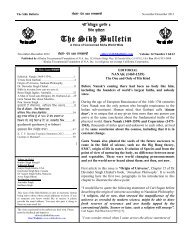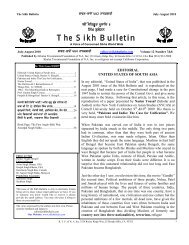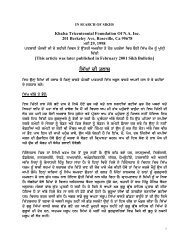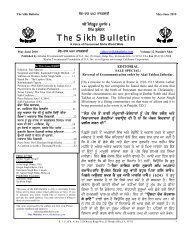Create successful ePaper yourself
Turn your PDF publications into a flip-book with our unique Google optimized e-Paper software.
<strong>The</strong> <strong>Sikh</strong> <strong>Bulletin</strong> &`gx 535 February 2004<br />
or scriptural literature (e.g. rehatnamas, hukamnamas,<br />
gurbani) In case someone thinks 'dharam' means 'religion',<br />
they are sorely mistaken! Dharam is a much more fuller,<br />
substantive and wholesome term than 'religion'. 'Dharam'<br />
means a totalised and holistic lifestyle of righteous living<br />
(code of ethical conduct, philosophy of life, etc). It was<br />
used in this sense by the <strong>Sikh</strong> Founding Fathers (the 'Gurus').<br />
For example:<br />
"(Guru Nanak) gave a new code of conduct, as the high<br />
way of spiritual life. Thus, Guru Nanak restored to<br />
DHARMA, its lost feet. He blended all classes and creeds<br />
into one social order: the SIKHS. In this, he gave the<br />
lowliest social equality with the kings; and taught<br />
humility and dignified living to the world." Bhai Gurdaas,<br />
Var 1, 24<br />
<strong>Sikh</strong> writers continue to confuse and misinterpret 'religion'<br />
and 'Dharam' as the same things (much like the term<br />
'Khaalsa' meaning the 'pure'). 'Dharam' is higher than the<br />
confines of institutionalised 'religion' (e.g. Catholicism,<br />
Protestantism). It is about human society and its<br />
wholescale ethical functionality. <strong>The</strong> authentic Khaalsa<br />
culture, society and people are a dharamic nation and<br />
civilisation.<br />
<strong>The</strong> <strong>Sikh</strong> Gurus never meant us to be a religion. <strong>The</strong>y meant<br />
us to be a full-fledged people, a nation, a PANTH -<br />
defined and driven by a comprehensive ethical human<br />
culture ('a network of ideas, values and customs which<br />
define the behaviour of a society').<br />
3. <strong>The</strong> term religion was first brought to the <strong>Sikh</strong>s by the<br />
British colonialists, in the 19th century during their<br />
conquest of Panjaab. British officialdom began to describe<br />
the <strong>Sikh</strong>s as a 'religion'. <strong>The</strong> British used various disjointed<br />
and half-baked descriptions about the <strong>Sikh</strong>s - their lifestyle,<br />
their ethics and collective community. For example, the<br />
'Khalsa' was frequently described as a 'military sect'. <strong>The</strong><br />
Darbar Sahib was described as a 'temple of worship'. Indeed,<br />
even today, the term 'temple' and 'place of worship' is<br />
routinely applied to gurdwaras. Moreover, the learned<br />
<strong>Sikh</strong>s have absorbed and imbibed these misdescriptions;<br />
and frequently use them themselves, pliantly. <strong>The</strong><br />
Gurdwara is neither a 'temple' nor a place of 'worship' (a<br />
English term for formal religious 'prayer' etc). In sum total,<br />
the <strong>Sikh</strong>s have blindly and pliantly accepted terminology<br />
superimposed by a conquering power! (highly reflective of<br />
the current subdued and pliant '<strong>Sikh</strong>' mental character, in<br />
contrast with the pre-1849 staunch Panjaabi - <strong>Sikh</strong>s who were<br />
annihilated by the invading British, much like the Scottish<br />
highland stalwarts).<br />
4. <strong>The</strong> term 'religion' comes with a great deal of negative<br />
and institutionalised baggage. <strong>The</strong> religious establishment<br />
throughout Europe, over previous centuries, and indeed, the<br />
current time; has been involved in great social and political<br />
controversies and scandals, and sanctioned aggressive wars<br />
by the prevaling imperialistic states. Religion is associated<br />
with institutional control, formalisms, ritual, tight and<br />
oppressive authority and officialdom. This is certainly not<br />
the substance of the Khaalsa philosophy, lifestyle or<br />
movement or peoplehood! Indeed, the exact opposite.<br />
5. Religious groups do not have rights in international<br />
law! <strong>The</strong> nearest thing to religious rights, is the right to<br />
freedom of thought and expression and freedom of 'religion',<br />
etc, as defined in the Universal Declaration of Human<br />
Rights. Religious groups do not have any COLLECTIVE<br />
rights as a collective community, unlike ethnic-national<br />
groups, in international law. <strong>The</strong>re is no legal basis for<br />
self-determination for a 'religious minority' or a<br />
'religious community'. <strong>The</strong> <strong>Sikh</strong>s presenting themselves as<br />
a 'persecuted religious minority' in India, diverts massively<br />
and most fundamentally, from the correct principles of the<br />
<strong>Sikh</strong> case - a nation undemocratically and oppressively<br />
colonialised and subjugated by a state (INDIA). It makes<br />
no intellectual sense for a 'religious' community to seek<br />
autonomy, self-determination or self-rule, merely<br />
because of their different style of worship, different<br />
prayers, different centres of worship. That is like,<br />
buddhists demanding territorial and political separation<br />
from christians. In contrast, a nation - a people who have<br />
a collective way of life and a collective society of their<br />
own, and seek to function and develop as a collective<br />
human unit - has much more comprehensive<br />
and overarching basis for self-existence and independent<br />
existence. A nation wishes to function as a full-fledged<br />
comprehensive society - social, political, civic and<br />
legislative; based on its cultural, social and spiritial<br />
substance and values - customs, heritage, codes, norms. This<br />
is why the Khaalsa civilisation decidely qualifies as a<br />
nation more than as a mere 'religion', much less a<br />
'religious minority'!<br />
<strong>The</strong> reduction of <strong>Sikh</strong>s to a 'religious' group, as against a<br />
ethnic group, is driven by the duplicitous and oppressive<br />
desire to deny the <strong>Sikh</strong>s their legal rights as a distinct<br />
and full-fledged people. Being a 'religion' gives <strong>Sikh</strong>s no<br />
legal strength or basis. Indeed, discussions by the <strong>Sikh</strong><br />
Commonwealth (London) with western governments'<br />
representatives and in the United Nations (New York) about<br />
<strong>Sikh</strong> nationhood were often complicated and impeded by<br />
Indian pre-information, that <strong>Sikh</strong>s were only a 'religious'<br />
group.<br />
6. <strong>Sikh</strong>s says they are a 'nation', and claim national<br />
rights. How do they reconcile this with their constant and<br />
repititive self-description as a 'religious' group, seeking<br />
'religious rights and freedoms'<br />
<strong>The</strong> <strong>Sikh</strong> Center Roseville, 201 Berkeley Ave, Roseville, CA. 95678 12
















